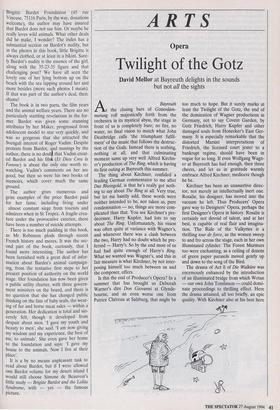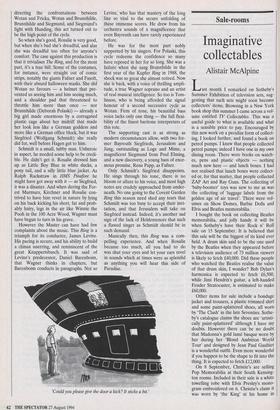ARTS
Opera
Twilight of the Gotz
Bayreuth thethe closing bars of GOtterdam- merung roll majestically forth from the orchestra in its mystical abyss, the stage in front of us is completely bare; no fire, no water, no final vision to match what John Deathridge calls 'the triumphant fulfil- ment' of the music that follows the destruc- tion of the Gods. Instead there is nothing, nothing at all, and that culminating moment sums up very well Alfred Kirchn- er's production of The Ring, which is having its first outing at Bayreuth this summer.
The thing about Kirchner, confided a leading German commentator to me after Das Rheingold, is that he's really got noth- ing to say about The Ring at all. Very true, but let me hastily add, these words were neither intended to be, nor taken as, pure condemnation — no, things are more com- plicated than that. You see Kirchner's pre- decessor, Harry Kupfer, had lots to say about The Ring. Unfortunately, his vision was often quite at variance with Wagner's, and whenever there was a clash between the two, Harry had no doubt which he pre- ferred — Harry's. So by the end most of us had had quite enough of Harry's Ring. What we wanted was Wagner's, and this in fair measure is what Kirchner, by not inter- posing himself too much between us and the composer, offers.
Is this the end of Producer's Opera? In a summer that has brought us Deborah Warner's dire Don Giovanni at Glynde- bourne, and an even worse one from Patrice Chereau at Salzburg, that might be
too much to hope. But it surely marks at least the Twilight of the Gotz, the end of the domination of Wagner productions in Germany, not to say Covent Garden, by Gotz Friedrich, Harry Kupfer and other damaged souls from Honecker's East Ger- many. It is especially remarkable that the distorted Marxist interpretations of Friedrich, the licensed court jester to a bankrupt regime, should have been in vogue for so long. If even Wolfgang Wagn- er at Bayreuth has had enough, then three cheers, and let us in gratitude warmly embrace Alfred Kirchner, mediocre though he be.
Kirchner has been an unassertive direc- tor, not merely an intellectually inert one. Rosalie, his designer, has moved into the vacuum he left. Thus Producers' Opera gave way to Designers' Opera, perhaps the first Designer's Opera in history. Rosalie is certainly not devoid of talent, and at her best, is capable of real flair and imagina- tion. The Ride of the Valkyries is a thrilling tour de force, as the women sweep to and fro across the stage, each in her own illuminated cylinder. The Forest Murmurs too were enchanting, as a ceiling of dozens of green paper parasols moved gently up and down to the song of the Bird.
The drama of Act 11 of Die Walkiire was enormously enhanced by the introduction of an illuminated bridge from which Wotan — our own John Tomlinson — could domi- nate proceedings to thrilling effect. Here the drama attained, all too briefly, an epic quality. With Kirchner also at his best here directing the confrontations between Wotan and Fricka, Wotan and Brunnhilde, Brunnhilde and Siegmund, and Siegmund's fight with Hunding, this act turned out to be the high point of the cycle.
So when she's good, Rosalie is very good, but when she's bad she's dreadful, and alas she was dreadful too often for anyone's comfort. The case against this production is that it trivialises The Ring, and for the most part, it's a true bill. Some of the costumes, for instance, were straight out of comic strips, notably the giants Fafner and Fasolt, with their absurd halloween masks. She did Wotan no favours — a helmet that pre- vented us seeing him and him seeing much, and a shoulder pad that threatened to throttle him more than once — nor Brunnhilde (Deborah Polaski) — already a big girl made enormous by a corrugated plastic cage about her midriff that made her look less like a German goddess and more like a German office block, but it was Siegfried (Wolfgang Schmidt) she really did for, well before Hagen got to him.
Schmidt is a small, tubby man. Unheroic in aspect, he needed some help to be credi- ble. He didn't get it. Rosalie dressed him up as Little Boy Blue in white ducks, a pony tail, and a silly little blue jacket. As Ralph Rackstraw in HMS Pinafore he might have got away with it — as Siegfried, it was a disaster. And when during the For- est Murmurs, Kirchner and Rosalie con- trived to have him revel in nature by lying on his back kicking his short, fat and prob- ably hairy, legs in the air like Winnie the Pooh in the 100 Acre Wood, Wagner must have begun to turn in his grave.
However the Master can have had few complaints about the music. This Ring is a triumph for its conductor, James Levine. His pacing is secure, and his ability to build a climax unerring, and reminiscent of the great Knappertsbusch. It was said of Levine's predecessor, Daniel Barenboim, that Wagner thinks in chapters, but Barenboim conducts in paragraphs. Not so Levine, who has that mastery of the long line so vital to the secure unfolding of these immense scores. He drew from his orchestra sounds of a magnificence that even Bayreuth can have rarely experienced before.
He was for the most part nobly supported by his singers. For Polaski, this cycle redeems the confidence so many have reposed in her for so long. She was a failure when she sang Brunnhilde in the first year of the Kupfer Ring in 1988, the shock was so great she almost retired. Now she is back, with a voice of thrilling ampli- tude, a true Wagner soprano and an artist of real musical intelligence. So too is Tom- linson, who is being afforded the signal honour of a second successive cycle as Wotan. Firm of tone, his beautiful bass voice lacks only one thing — the full flexi- bility of the finest baritone interpreters of this role.
The supporting cast is as strong as modern circumstances allow, with two for- mer Bayreuth Siegfrieds, Jerusalem and Jung, outstanding as Loge and Mime, a magnificent Siegmund from Poul Elming, and a new discovery, a young bass of enor- mous promise, Rene Papp, as Fafner.
Only Schmidt's Siegfried disappoints. He sings through his tone, there is no bloom or allure to his voice, and most high notes are crudely approached from under- neath. No one going to the Covent Garden Ring this season need shed any tears that Schmidt was too busy to accept their invi- tation, and that Jerusalem will take on Siegfried instead. Indeed, it's another sad sign of the lack of Heldentenors that such a flawed singer as Schmidt should be in such demand.
Musically then, this Ring was a com- pelling experience. And when Rosalie became too much, all you had to do was shut your eyes and let your ears revel in sounds which at times were as splendid as anything you will hear this side of Paradise.
'Could you please give the door a kick? It sticks a bit.'



























































 Previous page
Previous page